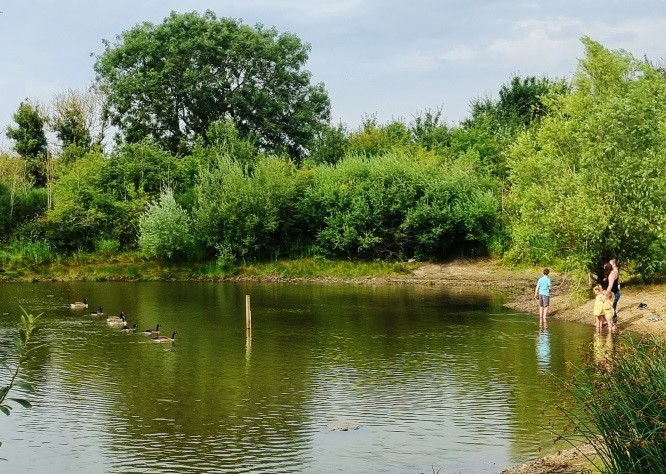Biodiversity Explained

What is Biodiversity?
Biodiversity is the combination of two words, Bio (meaning “life”) and Diversity (meaning “variety”) so Biodiversity is the variety of life. It refers to all of the diverse life that can be found on Earth.
Why is Biodiversity so important?
Biodiversity is extremely important to people and to the health of ecosystems.
(An ecosystem is a geographic area where plants, animals, and other organisms, as well as weather and landscapes, work together to form a bubble of life)
As humans, biodiversity is essential for life – for example, it provides our food, makes oxygen, cleans our water, gives us medicines. However, it is under threat.
Threats to Biodiversity include:
- Climate Change
- Pollution & Litter
- Loss of natural habitat
- Extinction of plants, animals, insects, birds, etc.
Woolsington Parish Council faces challenges in trying to improve biodiversity in our area.
The whole area and its ecosystems face many challenges, not least from rapidly emerging new housing developments and associated infrastructure. Large areas of land in the Parish are allocated for residential development within the City Council’s One Core Strategy. Up to 1500 new homes are proposed on fields in the Upper Ouseburn area and consequently close to the Parish Ponds. Unfortunately, with increased housing development and new roads comes the increased risk of pollution, fly-tipping and flooding. This results in a cumulative threat to the environment and wildlife and in diminishing green and blue spaces. We are working with the Local Planning Authority, landowners and developers to seek improvements for both nature and the community.
The Value of our Blue Spaces
Ponds are fantastic places for wildlife. They support a multitude of freshwater plants, animals and birds, including many which are nationally and internationally threatened. In urban areas, ponds in gardens, parks and schools can be an oasis for nature, literally buzzing with life, and can provide important refuges and stepping stones for species through the urban environment.
Ponds also provide a valuable link between people and wildlife; ponds are a place to watch dragonflies, dip for tadpoles or simply relax. The number of good wildlife ponds has declined due to changes in the way we manage our green spaces and as a consequence of increasing pressures within our Parish. By protecting our rivers, maintaining our ponds and creating new wildlife ponds we can help to reverse these declines.
The Value of Pollinators
We love to look at butterflies, moths, bees, hoverflies and other insects but they have a function which is so much more important. Together with birds and bats, they are all pollinators, taking pollen between flowering plants. Thanks to pollination plants can make seeds, which in turn reproduce and make new plants. The food we eat depends on plants being pollinated. We can take pollinators for granted but they are vital for stable, healthy food supplies and key to the varied, colourful and nutritious diets we need.
The WPC website has photos of some lovely butterflies and moths seen in our Parish in 2021 www.woolsington-parish-council.com
Please keep an eye out this year and send us your images via email to woolsingtonpc@gmail.com
The Value of Wildlife Corridors
Wildlife Corridors act like stepping stones for nature. They help connect areas of habitat, allowing species to move between them, to feed, disperse, migrate or reproduce. They must be joined up, maintained and enhanced. We are seeking advice on how to do this in our Parish area.
Progress to date with the WPC Area Biodiversity Project
Each year, WPC assembles an annual budget in order to help fulfil its Area Biodiversity Project, with the prime objectives of:
a) preserving and enhancing natural habitats for wildlife
b) maintaining and connecting wildlife corridors for existing and future generation
c) improving general health and well-being in the community
So far our projects have included:
- Working with local volunteers to introduce Community projects across all 4 Wards, including creating flower beds + barrels, planting crocus carpets, daffodils and snowdrops, wildflower strips, trees and hedging and installing bird boxes
- Working with our 4 Primary schools to supply plants, trees and materials to support outdoor learning
- The introduction of conservation schemes and site improvements at the Parish Ponds, and in Bluebell Dene, with plans for Abbotswood, on Airport land, to follow
Looking ahead, our plans include supporting the City Council with the introduction of the Nature Strategic Planning Document (SPD), and working with Landowners, other Agencies and Trusts in defining a Strategy for joining up wildlife corridors across the Parish.
Now we need your help in future-proofing our green and blue spaces
We need to know your thoughts and ideas. This will help us understand what is important to you in addressing the threats to biodiversity and assist us in making informed judgements on priorities for conservation in the Parish.
So please complete our Biodiversity Questionnaire: Have Your Say Biodiversity Questionnaire: Have Your Say - Woolsington Parish Council (woolsington-parish-council.com)
In the meantime, we can all do something to help improve biodiversity:
- Pick up litter
- Plant pollinator friendly flowers
- Reduce, reuse, recycle
- Shop locally with a reusable bag
- Appreciate and enjoy the plants, animals, insects and trees in our Parish